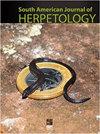鳄鱼免疫系统研究进展综述
IF 0.7
4区 生物学
Q4 ZOOLOGY
引用次数: 0
摘要
摘要尽管爬行动物在进化史上的关键地位,爬行动物的免疫反应受到相对较少的关注。像所有有颌脊椎动物一样,爬行动物拥有先天和适应性免疫系统来识别未知的外来物质。虽然已经发现了多种免疫机制,但它们似乎不足以避免某些微生物的入侵和阻止某些感染。所有种类的鳄鱼都表现出明确的社会行为,在雄性和雌性鳄鱼中都可以观察到等级统治态度。这种行为会产生冲突,并通过攻击和战斗表现出来,造成严重的健康后果。这些动物已经进化出一种非常活跃的免疫机制和成分,可以提供快速有效的防线。科学一直关注这些机制和组成部分,因为鳄鱼是一个特别有趣的群体,可以进行进化研究,因为它们是幸存的祖龙之一,代表了“高等”脊椎动物中的一个重要环节。基于这些背景,人们正在观察和评估它们在家养和野生物种中的潜在应用。这些发现不仅将作为一种治疗资源产生越来越大的价值,而且对生态系统和解码可能导致系统发育(祖先)认知的生物过程也有越来越大的价值。在这篇综述中,鳄鱼免疫系统的许多组成部分被描述,可以导致一个更彻底的了解这些动物如何选择最适当的反应环境挑战和抗原暴露,并确定网络研究和有趣的机会,在该领域的专家。本文章由计算机程序翻译,如有差异,请以英文原文为准。
Review of the Recent Knowledge on the Crocodilian Immune System
Abstract. Despite the key position of reptiles in evolutionary history, reptilian immune responses have received relatively little attention. Like all jawed vertebrates, reptiles possess both an innate and adaptive immune system to recognize unknown foreign substances. Although diverse immunological mechanisms have been discovered, they seem not to be adequate to avoid the invasion of some microorganisms and stop some infections. All species of crocodilians show well-defined social behaviors, and hierarchical dominance attitudes can be observed in both males and females. This behavior generates conflicts that are expressed through aggression and combat with serious health consequences. These animals have evolved a very active immune mechanisms and components that provides a fast and effective line of defense. Science has focused on those mechanisms and components because crocodilians are an especially interesting group on which to perform evolutionary studies because they are one of the surviving archosaurs, which represents an important link within “higher” vertebrates. Based on those background, they are being observed and evaluated for their potential application in domestic and wild species. These findings will not only generate an increasing value as a therapeutic resource but also to the ecosystem, and to decode biological processes that could lead to phylogenetic (ancestral) cognition. In this review, many components of the crocodilian immune system are described that could lead to a more thorough understanding of how these animals select the most appropriate response to environmental challenges and antigen exposure and identify networks to study and interesting opportunities to the experts in the field.
求助全文
通过发布文献求助,成功后即可免费获取论文全文。
去求助
来源期刊
CiteScore
1.50
自引率
0.00%
发文量
10
期刊介绍:
The South American Journal of Herpetology (SAJH) is an international journal published by the Brazilian Society of Herpetology that aims to provide an effective medium of communication for the international herpetological community. SAJH publishes peer-reviewed original contributions on all subjects related to the biology of amphibians and reptiles, including descriptive, comparative, inferential, and experimental studies and taxa from anywhere in the world, as well as theoretical studies that explore principles and methods.

 求助内容:
求助内容: 应助结果提醒方式:
应助结果提醒方式:


